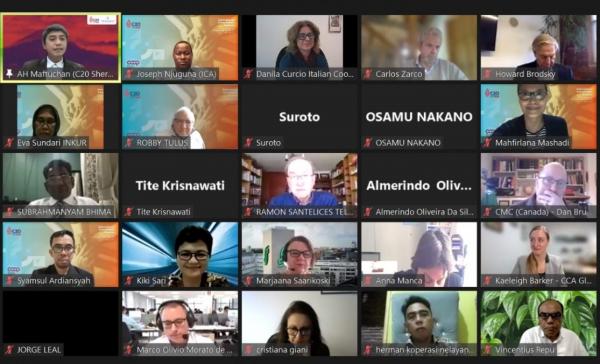
ICA formed the G20 Working Group in 2021 to bring together the most prominent cooperative business leaders from G20 countries with the mission to elevate the benefits of the cooperative business model, establish cooperatives as a viable business solution, and spur meaningful policy discussion at the highest levels of G20 discussions.
This year, the Indonesian G20 Presidency is focusing on three main pillars, namely: Global Health Architecture, Sustainable Energy Transition, and Digital Transformation. The ICA member in Indonesia, INKUR Federation, is leading the process of ensuring cooperatives are represented in the B20 and C20 task forces. ICA believes that cooperatives have much to offer in terms of the economy, society, and the environment. To add to their substantial contributions as enterprises, the people-centred and values and ethics-based approach to doing business means that cooperatives have a unique voice to bring to the B20 and C20 platforms. Therefore, ICA engages in the B20 taskforces and C20 Working Groups to contribute to the success of the Indonesian presidency.
On 13 April, 2022, the INKUR Federation and ICA organsied an international consultation seminar on "Operation to Build Sustainable Economic Democracy" in Jakarta, Indonesia in the C20 track of the G20 forum Indonesia.
Mr. Howard Brodsky, CEO and Chairman of CCA Global Partner Cooperative, and Chairman of the ICA Working Group for G20 said, cooperation is different with capitalist companies and place people as priority, cooperation has proven that democracy and equality "can work effectively in business".
According to the ICA, there are at least 1.2 billion people on Earth who are cooperative owners of 3 million primary-level cooperatives worldwide. Cooperation has given jobs to 10% of the world's workforce. Out of these, 300 of the world's largest cooperatives have generated a turnover of 2,146 billion USD.
Mr. Osamu Nakamo, Board Member & International Relations Officer of the Japanesse Worker Cooperative Union (JWCU) said that cooperatives have provided deserving jobs to many people across the country.
Cooperatives are present in every sector, be it retail, financial services such as banking, insurance, food sector, or public services such as health. They are a convenient service to many because the healthcare system is also owned by its patients.
In the financial sector, cooperative banks such as Agricole Bank, Desjardin Bank, have become world-class banks. Mr. Bhima Subrahmanyam, President of the International Cooperative Banking Association (ICBA) said that encouraging a sustainable financial system has internal and external challenges like how the cooperatives are recognised in fiscal policy and by the central banks, the availability of subsidies in fiscal and others.
Mr. Carlos Zarko, President of the International Health Cooperative Organization (IHCO), one of the sectoral organizations of ICA said, health cooperatives around the world have not only been helping to serve patients of Covid-19 but also encourage mitigating the social and economic impact.
Ms. Eva Sundari, from the INKUR Federation, said, cooperation has encouraged gender justice in a broad sense, it not only encouraged the role of women but also the youth, disabled and those vulnerable, cooperative with values and principles encourage people to create just, inclusive and sustainable development systems.
AH Maftuchan, C20 Sherpa and Executive Director of PRAKARSA noted that under the presidency of Indonesia, C20 is committed to advocating for evidence-based policy recommendations. Its priority issues are based on a desperate global call to address socio-economic issues touching the daily lives of people, starting from the welfare of migrant workers and vulnerable groups, access to COVID-19 vaccines, and empowerment of women, until energy transition and cooperation have a strategic and important role in this.
The cooperative business model has proven itself for over 250 years as a catalyst for economic diversification, sustainability, and growth for rural and cultural communities. The cooperatives have shown resilience in the time of economic and financial crisis to the ongoing health crisis due to the Covid-19 pandemic.
Since 2016, cooperatives have been recognized in global development initiatives such as the UN Decision of Rio+20 Results Documents, Development Financing Results Documents and UN 2030 Agenda for Sustainable Development.



